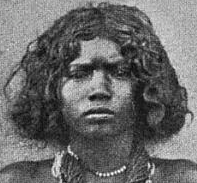Irula people
Irula are a Dravidian ethnic group inhabiting the area of the Nilgiri mountains, in the states of Tamil Nadu and Kerala, India.[2] A scheduled tribe, their population in this region is estimated at 25,000 people.[3][4] People of Irula ethnicity are called Irular, and speak Irula, which belongs to the Dravidian family.[5]
Irula rat catchers, Tamil Nadu | |
| Total population | |
|---|---|
| 203,382[1] (2011 census) | |
| Regions with significant populations | |
| Tamil Nadu | 189,621 |
| Kerala | 23,721 |
| Languages | |
| Irula language | |
| Religion | |
| Hinduism | |
| Related ethnic groups | |
| Soliga, Tamil, Yerukala | |
Etymology
Irular means "dark people" in Tamil and Malayalam, from the root word irul, meaning "darkness", in reference to their dark skin complexion.[6]
The tribe numbers 189,621 in significant region of Tamil Nadu and 23,721 in Kerala.
Anthropology

Early 20th century anthropological literature classified the Irula under the Negrito ethnic group. Other anthropologist suggested a proto-Caucasoid ancestry.[4][7] Modern genetic studies suggest a relation to other South Asians but do not show any genetic relation to Negrito or Australoid populations.[8]
Genetics
A study by Yelmen et al (2019) found that the Irula were the closest likely proxy for the 'AASI', or Ancient Anscestral South Indian, one of the presumed founder and autochthonous original Indian populations. They showed a closer fit when modelled than alternatives that have been suggested such as the Onge.[9]
Language
The Irula speak the Irula language, a Dravidian language that is closely related to Tamil.[10]
Distribution
Irular live in two south Indian states – Tamil Nadu and Kerala. In Tamil Nadu they live in the Nilgiris, Coimbatore, Erode, Namakkal, Salem and Dharmapuri. In Kerala they live in the Palakkad district and Attapady and Walayar panchayats.
They live in four taluks in Coimbatore district, namely Coimbatore South, Coimbatore North, Avinashi and Madathukulam. The Coimbatore district houses 4254 Irulas in 40 settlements comprising 139 villages. Nearly 100 Vettakada Irula settlements are found in the forest areas or in the deep mountainous jungles. There are 4 tribal settlements in the Siruvani Hills comprising 14 villages.[11]
The Census of Kerala identified 756 Irulan individuals from 189 families, who lived in 9 settlements covering .23 km² in the state.[12]
Economy
Traditionally, the main occupation of the Irulas has been snake, rat catching and honey collection. They also work as labourers (coolies) in the fields of the landlords during the sowing and harvesting seasons or in the rice mills. Fishing and cattle farm is also a major occupation.
Rats destroy a quarter of the grain grown on Tamil Nadu-area farms annually. To combat this pest, Irula men use a traditional earthen pot fumigation method. Smoke is blown through their mouths, which leads to severe respiratory and heart problems.[3]
In January 2017, Masi Sadaiyan and Vadivel Gopal from the Irula tribe of Tamil Nadu were brought in, along with two translators, to work with detection dogs to track down and capture invasive Burmese pythons in Key Largo, Florida.[13] The Irula men and their translators were paid $70,000 by the State of Florida, and captured 14 pythons in less than two weeks.[14]
See also
References
- "A-11 Individual Scheduled Tribe Primary Census Abstract Data and its Appendix". censusindia.gov.in. Government of India. Retrieved 28 October 2017.
- Perialwar, R. (1979), Phonology of Irula with Vocabulary, Annamalai University
- World Bank grant to improve standard of living for rat-catchers
- Irula Project Proposal and site report
- President gives nod to add Puducherry's Irular community in the Scheduled Tribes list
- "Irular in India". Joshua Project. Frontier Ventures. Retrieved 5 June 2016.
- Giving Irulas their due
- Reich, David; Pinhasi, Ron; Frachetti, Michael; Kennett, Douglas; Thangaraj, Kumarasmy; Boivin, Nicole; Anthony, David; Meyer, Matthias; Lalueza-Fox, Carles (31 March 2018). "The Genomic Formation of South and Central Asia". bioRxiv: 292581. doi:10.1101/292581.
- Yelmen, Burack; Mondal, Mayukh; Marnetto, David; Pathak, Ajay; Montinaro, Francesco; Romero, Irene; Kivisild, Toomas; Metspalu, Mait; Pagani, Luca (5 April 2019). "Demographic Histories and Opposite Selective Pressures in Modern South Asian Populations". Cite journal requires
|journal=(help) - Keystone Foundation (2006) "People of the Nilgiri Biosphere Reserve" retrieved 3/26/2007(NBR)"People of the Nilgiri Biosphere Reserve" Archived 29 September 2007 at the Wayback Machine
- Dr. Pauline Das, The Irula Language and Literature
- "Tribal Settlements in the Forests of Kerala". Kerala Department of Forests and Wildlife. 18 September 2009. Retrieved 19 June 2016.
- Snake hunters from India are the latest weapons in Florida’s war on pythons
- One Florida agency put out a want ad for python killers
External links
| Wikimedia Commons has media related to Irula people. |
- . Encyclopædia Britannica. 14 (11th ed.). 1911. p. 853.
- "fwc news: Irula tribesmen and detector dogs help UF/IFAS and FWC remove pythons in Florida". Florida Fish and Wildlife Conservation Commission. 23 January 2017. Retrieved 23 September 2018.
- "One Florida agency put out a want ad for python killers". msn.com. 15 March 2017. Archived from the original on 15 March 2017.
- "Building a better Rat Trap: Technological Innovation, Human Capital and the Irular" - Economic Research Paper about the Irula
- "Irular: The Seekers of light" - Article by G. S. Unnikrishnan Nair in Kerala Calling March 2014